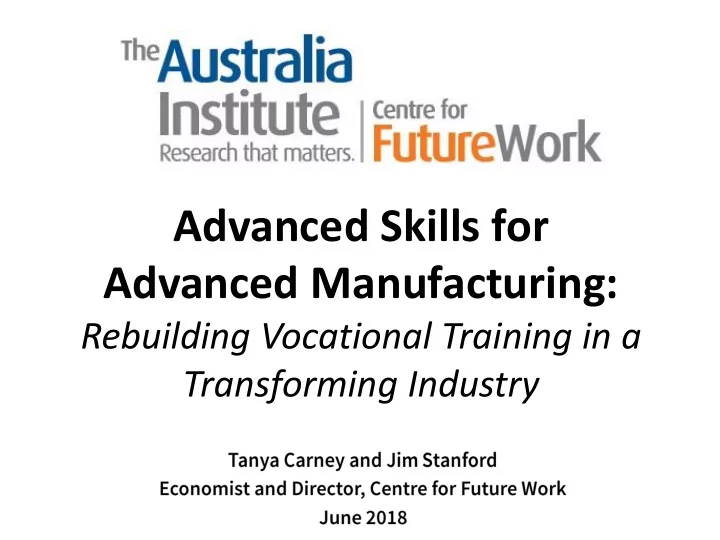

Advanced Skills for Advanced Manufacturing: Rebuilding Vocational Training in a Transforming Industry
www.futurework.org.au @jimbostanford @cntrfuturework
Better News at Last 50,000 jobs in 12 mos.
Don’t Cut the Recovery Short • Skills shortages could arise quickly, constraining future growth: – Sectoral & occupational diversity – Demographic transition of older workers – Increasing complexity and breadth of required skills (advanced manufacturing; digital technologies; desired integration of skill sets)
Winners and Losers
Occupational Mix
We All Get Older
The Pipeline is Empty • Firms did not invest in apprentices and other skills development during the downturn. – Fiscal constraints – Uncertainty about future needs • Lack of hiring coincided with advancing age. • Irrationality of VET system exacerbated the problem. • Consequence: Skills shortages arising quickly.
Shortages of Engineering Trades ANZSCO Occupation 2008 2009 2010 2011 2012 2013 2014 2015 2016 2017 Code 3222-11 Sheetmetal Trades Worker S NS S S S S S S S S 3223-11 Metal Fabricator S NS NS S NS NS NS NS NS S 3223-13 Welder (First Class) S NS NS RS NS NS NS NS NS S 3231 Aircraft Maintenance S S S D NS NS NS NS NS S Engineer* 3232- 11,12,13 Fitter S NS S NS RS NS NS NS D S 3232-14 Metal Machinist (First S NS S S S NS S S D S Class) 3233-13 Locksmith S S S S NA S NA S S S Legend : NA Not assessed S Shortage RS Regional shortages - D Recruitment difficulty NS No shortage Source: Department of Jobs and Small Business (2018).
A Broken System • Australian VET system in crisis: – Fiscal cutbacks from government (focused on universities). – Failed experiment with marketisation. – VET FEE-HELP fiasco. – Deep crisis faced by TAFEs. • These problems afflict all sectors. • But manufacturing hid hardest: greatest need for apprentices & skills.
Plunging Participation Rates
Funds Diverted from VET Source: Pilcher and Torii (2017).
Other Challenges • Increasing complexity of required skills. • Fragmentation of curriculum into smaller units and microcompetencies. • Poor completion rates. • Access to training in precarious work.
Twelve Recommendations 1. Reestablish adequately funded and stable TAFEs as the centerpiece of vocational education. 2. Develop the capacities of TAFE manufacturing teachers and invest in modern training equipment. 3. Encourage partnerships on customised joint training initiatives between TAFEs and workplaces. 4. Expand other forms of integrated training between VET providers and workplaces. 5. Work to develop and implement higher-level and multi- disciplinary qualifications reflecting emerging skills and composite capacities. 6. Shift emphasis in curricula and training programs toward comprehensive and complete qualifications, rather than micro-competencies.
Twelve Recommendations 7. Integrate basic literacy and numeracy training into VET offerings at all levels. 8. Support apprenticeships in manufacturing with fiscal measures, instruction resources, and mentoring. 9. Implement provisions ensuring access to training opportunities within modern awards and enterprise agreements. 10. Develop better-resourced systems to support retraining and redeployment of displaced workers in declining sectors. 11. Develop models for phased retirement to smooth demographic transition facing skilled trade positions in manufacturing. 12. Establish a leadership-level Manufacturing VET Policy Board to coordinate VET initiatives in the sector, and represent the interests of manufacturing in broader VET processes and dialogues.
Conclusion • Our list not the final word. • Start the discussion about necessary reforms. • Participation from all stakeholders needed. • Move quick: – “Today’s inaction is tomorrow’s skills shortage.”
Thank You! www.futurework.org.au @jimbostanford @cntrfuturework
Recommend
More recommend